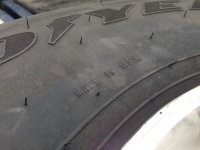Here's food for thought: the person towing the trailer to the dealer has no vested interest in tire life, other than to get it to the dealership in one piece. Bouncing over curbs, towing too fast, not checking tire pressure. I'm pretty sure this is what happened in my case. All 4 Powerking Towmax tires have failed. No damage as I monitor with a TPMS. After approx 5K miles each tire would keep climbing in temp and pressure. I am obsessive about tire pressure. I inflate to 80psi cold before each tow. The Towmax tires when new would operate between 88-90 psi. Temperature would never exceed 95 deg F. After they reached approx 5K miles the psi would climb to 97psi and 106 deg F at 60 MPH within 20 miles The temp and pressure would drop when driving slower. To test my theory, I installed the spare, the temp and pressure stayed with the 88-90psi, and under 95 deg F. Since I have replaced with Goodyear G614, 3,750 lb load @ 110psi. This is what is stamped on the inside of the rims. Also use metal valve stems.
Some more food for thought: Friends of ours bought the same trailer we did, only difference, they picked theirs up local. They have not had a tire failure yet. I would like to see stats on local pickup verses dealer delivered. I bet local pickup units experience less tire failure.
In summary: If you treat Towmax tires with the utmost of care, and they were not abused during delivery you might be OK, key word here is might. It was a no brainier to spend $1300 on the Goodyear G614's, considering fiberglass trailer repairs can run many thousand dollars. Not to mention the safety and aggravation factor of breaking down on the road.

